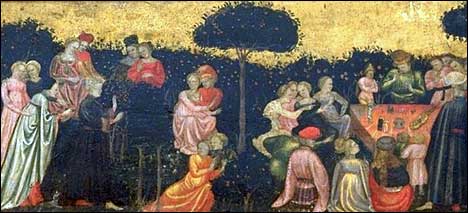|
|
|
|

Giovanni di Francesco Toscani. "The Garden of Love", c. 1420.
LENTEN YS COME
c1314-1349.
MS Harl. 2253, f71v.
Lenten ys come with love to toune,
With blosmen & with briddes roune,
That al this blisse bryngeth;
Dayes eyes in this dales,
Notes suete of nyhtegales;
Uch foul song singeth.
The threstelcoc him threteth oo;
Away is huere wynter wo,
When woderove springeth.
This foules singeth ferly fele,
Ant wlyteth on huere wynter wele,
That al the wode ryngeth.
The rose rayleth hire rode;
The leves on the lyhte wode
Waxen al with wille.
The mone mandeth hire bleo;
The lilie is lossom to seo,
The fenyl & the fille.
Wowes this wilde drakes;
Miles murgeth huere makes,
Ase strem that striketh stille.
Mody meneth, so doth mo;
Ichot ycham on of tho,
For love that likes ille.
The mone mandeth hire lyht,
So doth the semly sonne bryht,
When briddes singeth breme;
Deawes donketh the dounes,
Deores with huere derne rounes
Domes forte deme;
Wormes woweth under cloude,
Wymmen waxeth wounder proude,
So wel hit wol hem seme,
Yef me shal wonte wille of on,
This wunne weole y wole forgon
Ant wyht in wode be fleme.
Translation
Spring has come with love to town,
With blossoms and with birds' rounds,o
Which all this bliss bringeth;
Daisies in these dales,
Notes sweet of nightingales;
Each fowl a song singeth.
The threstlecock he scoldeth aye;
Away is their winter woe,
When woodruff springeth.
These fowls singeth fairly much,
And look back on their winter weal,o
So that all the wood ringeth.
The rose puts on her red;
The leaves on the trembling trees
Grow forth with eagerness.
The moon sends forth her brightness;
The lily is lovely to see,
The fennel and chervil.
Woo these wild drakes;
Beasts entertain their mates,
As streams which ever flow.
Sad ones moan, so do many more;
I know I am one of those,
Who are ill-pleased with love.
The moon sends forth her light,
So doth the pleasing sun bright,
When birds sing lustily;
Dews drench the hills,
Lovers with their secret songs
Their own laws to make;
Wyrms woo underground,
Women grow wondrously proud,
Which seems so becoming to them;
If I shall lack the goodwill of one,
This wondrous wealth I will forgo
And this wight in the woods be banished.
| |
songs
well-being (ironical)
|
|
Transcribed from the manuscript by Anniina Jokinen.
Translation and glosses Anniina Jokinen.

Manuscript image of British Library Harleian MS. 2253, fol. 71v.
 | to Middle English Lyrics |
 | to Luminarium Main |
 | to Middle English Literature |
Site copyright ©1996-2018 Anniina Jokinen. All Rights Reserved.
Created by Anniina Jokinen on November 26, 2008. Last updated on November 12, 2018.
|
|
Middle English Literature
Geoffrey Chaucer
John Gower
Sir Gawain and the Green Knight
William Langland / Piers Plowman
Julian of Norwich
Margery Kempe
Thomas Malory / Morte D'Arthur
John Lydgate
Thomas Hoccleve
Paston Letters
Everyman
Medieval Plays
Middle English Lyrics
Essays and Articles
Sciences
Medieval Cosmology
Historical Events and Persons
Hundred Years' War (1337-1453)
Edward III
Edward, Black Prince of Wales
Lionel of Antwerp, Duke of Clarence
John of Gaunt, Duke of Lancaster
Edmund of Langley, Duke of York
Thomas of Woodstock, Gloucester
Richard of York, E. of Cambridge
Richard II
Henry IV
Edward, Duke of York
Henry V
Thomas, Duke of Clarence
John, Duke of Bedford
Humphrey, Duke of Gloucester
Catherine of Valois
Charles VII, King of France
Joan of Arc
Louis XI, King of France
Charles the Bold, Duke of Burgundy
The Wars of the Roses (1455-1485)
Causes of the Wars of the Roses
The House of Lancaster
The House of York
The House of Beaufort
The House of Neville
Henry VI
Margaret of Anjou
Richard Plantagenet, Duke of York
Edward IV
Elizabeth Woodville
Edward V
Richard III
George, Duke of Clarence
More at Encyclopedia and at
Additional Medieval Sources
|
|